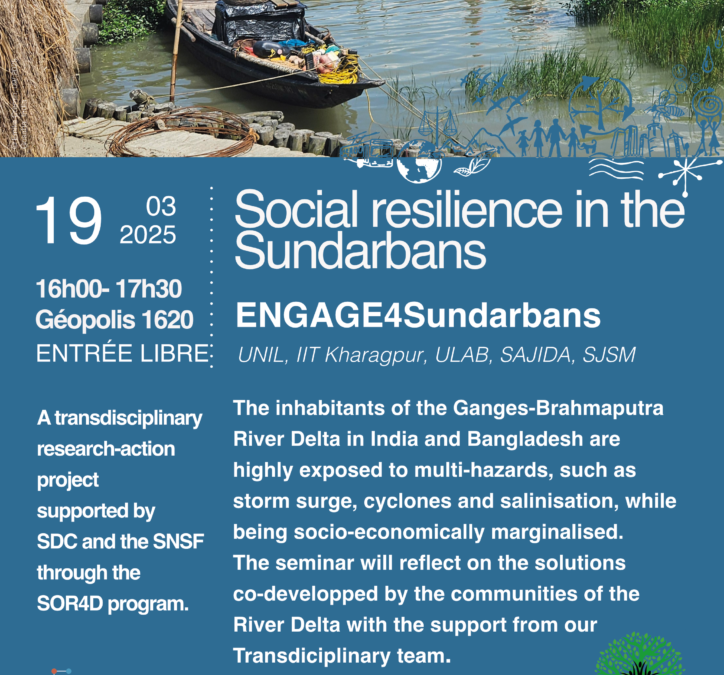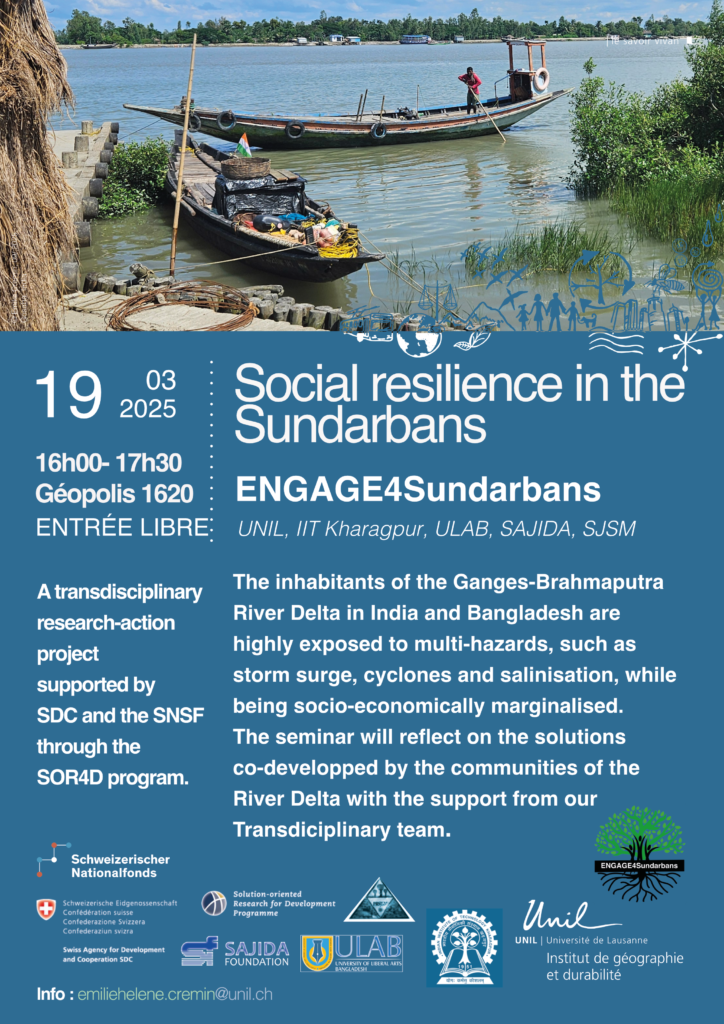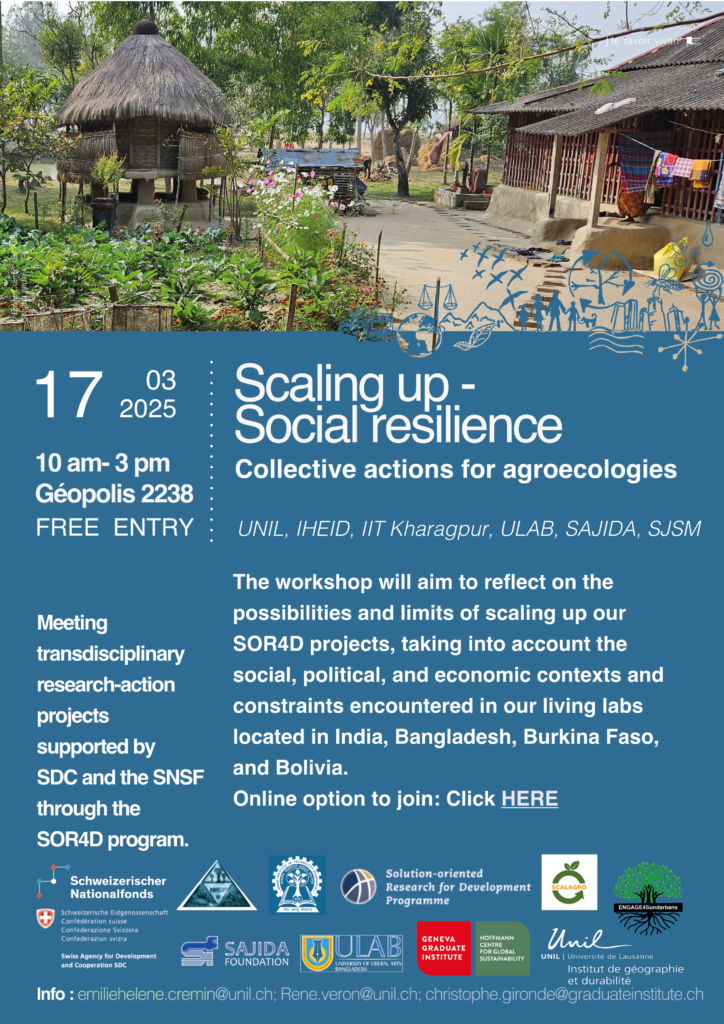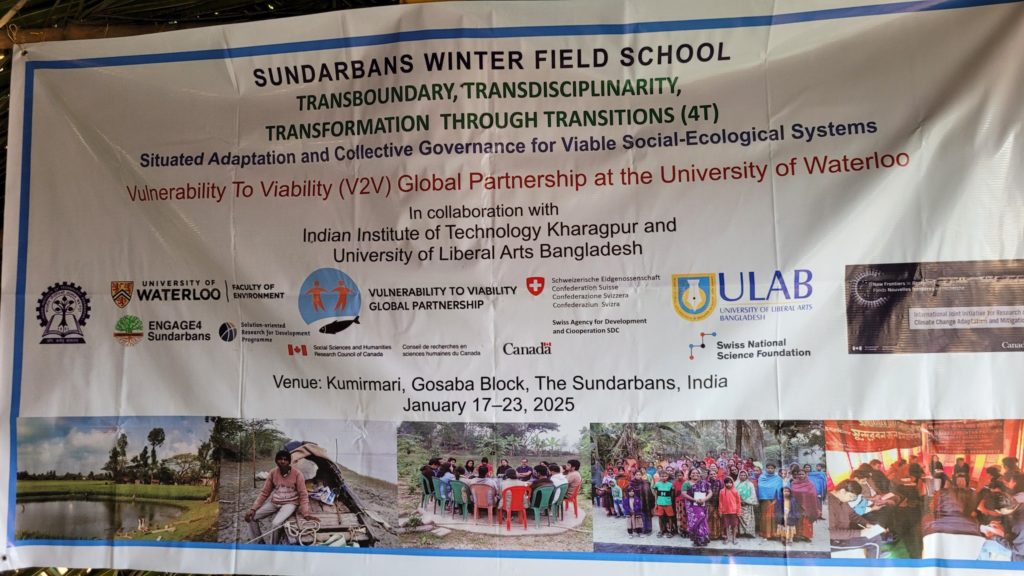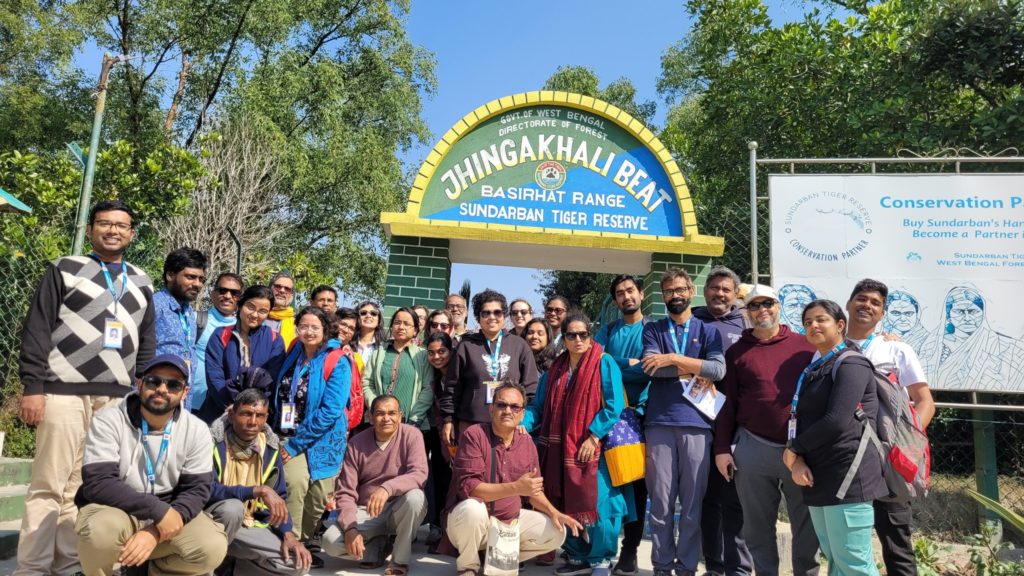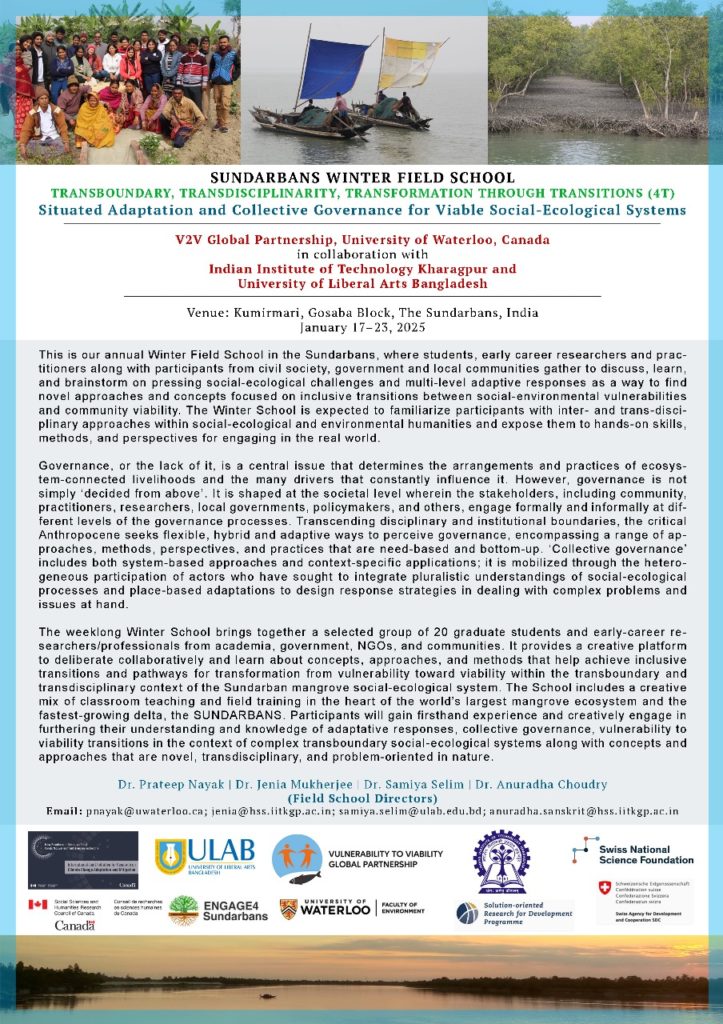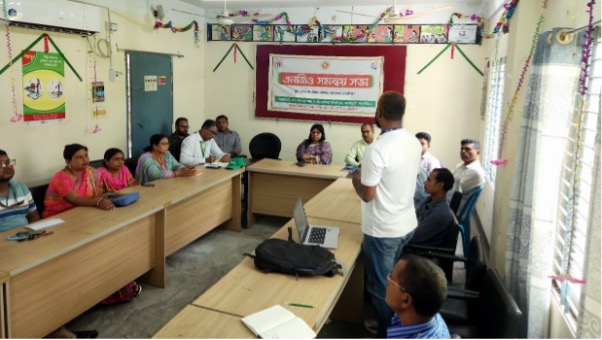
by emilie.cremin@gmail.com | May 20, 2025 | Previous Events
Assasuni, Satkhira — 20 May 2025
An NGO Coordination Meeting was held on 20 May 2025 in Assasuni, bringing together key government officials and representatives from a multitude of development organisations working in the region.
Showcasing ENGAGE’s Work in Pratapnagar
A significant highlight of the session was a presentation by Sabbir Ahmed, Living lab Manager, representing SAJIDA Foundation. He provided a comprehensive overview of the ongoing and planned project activities in Pratapnagar, detailing the research to experimentation initiatives currently underway. The presentation explained why Pratapnagar was chosen as a focal area and described how the ENGAGE project is working in collaboration with local farmers, entrepreneurs and union council showcasing their involvement in agroecological intervetions.
Following the presentation, the UNO encouraged open dialogue and invited questions from attendees. A key discussion point emerged around whether SAJIDA Foundation’s agro-processing and agricultural development plans would remain confined to Pratapnagar or expand to other areas.
Call for Collaboration and Future Focus
Rafiqul Islam, the Upazila Social Services Officer, appreciated SAJIDA Foundation’s research-based approach, noting that such initiatives are unprecedented in the region. He urged all stakeholders to actively support this initiative. He further emphasised the urgent need for research on women’s health in saline-affected areas, highlighting that women in several unions of Assasuni are experiencing complex health issues due to high salinity in water, encouraging future research in this area. 
Notably, Nazmus Sakib, the Upazila Agriculture Officer, shared that his department is planning to scale up sunflower cultivation in Pratapnagar. He explored the possibility of collaboration on this initiative and discussed areas where joint support could strengthen the impact.
Other NGOs participated in the dialogue, expressed their interest to learn more about ENGAGE’s approach, value addition and market linkage approach and ask if there are opportunities for collaboration especially on the value addition and market linkage initiatives.
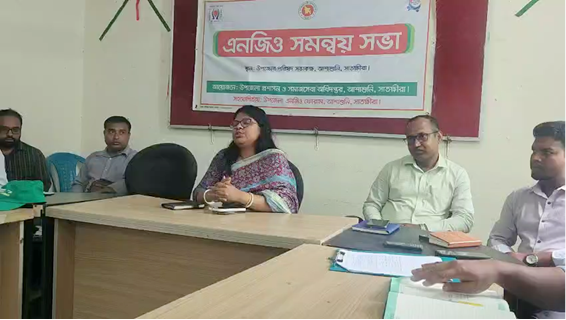
In her closing remarks, UNO Krishna Roy thanked SAJIDA Foundation for their meaningful research contributions and provided guidance on expanding their scope to address women’s health in saline-prone regions. She also stressed the importance of sharing research findings with relevant government departments to ensure effective policy and programme integration.
This meeting marks a significant step toward strengthening collaboration between the government and NGOs in Assasuni, with a shared commitment to sustainable development, community resilience, and research to action.
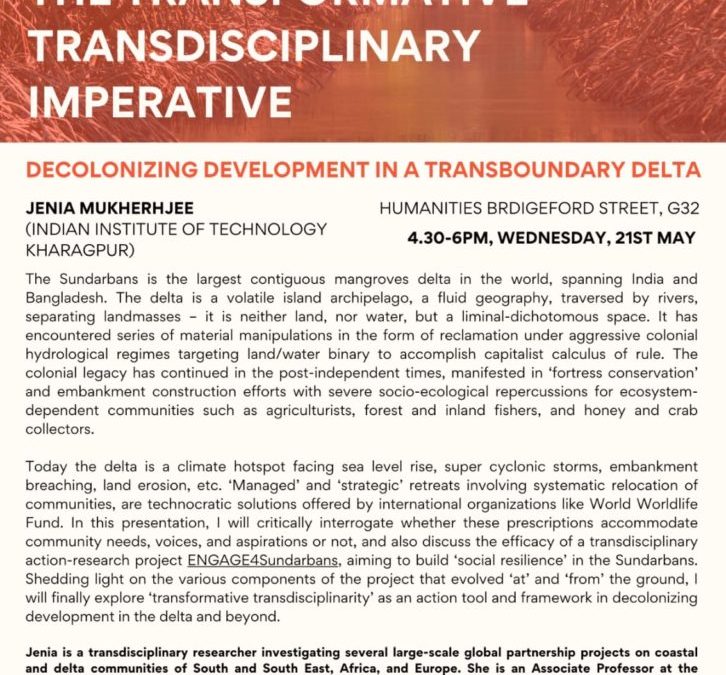
by emilie.cremin@gmail.com | May 18, 2025 | Previous Events
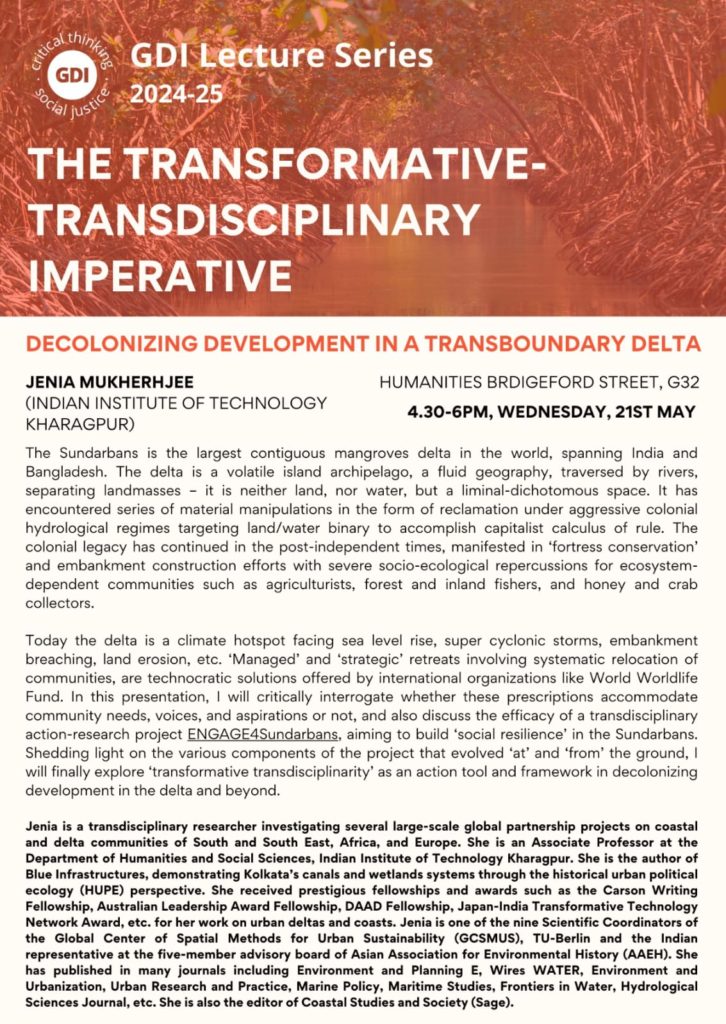
DECOLONIZING DEVELOPMENT IN A TRANSBOUNDARY DELTA –
JENIA MUKHERJEE (INDIAN INSTITUTE OF TECHNOLOGY KHARAGPUR)
Location : HUMANITIES BRIGEFORD STREET, G32 4.30-6PM, WEDNESDAY, 21ST MAY
The Sundarbans is the largest contiguous mangrove delta in the world, spanning India and Bangladesh. The delta is a volatile island archipelago, a fluid geography, traversed by rivers, separating landmasses – it is neither land nor water, but a liminal-dichotomous space. It has encountered a series of material manipulations in the form of reclamation under aggressive colonial hydrological regimes targeting the land/water binary to accomplish the capitalist calculus of rule. The colonial legacy has continued in the post-independent times, manifested in ‘fortress conservation’ and embankment construction efforts with severe socio-ecological repercussions for ecosystem-dependent communities such as agriculturists, forest and inland fishers, and honey and crab collectors.
Today the delta is a climate hotspot facing sea level rise, super cyclonic storms, embankment breaching, land erosion, etc. ‘Managed’ and ‘strategic’ retreats involving systematic relocation of communities, are technocratic solutions offered by international organizations like World Worldlife Fund. In this presentation, I will critically interrogate whether these prescriptions accommodate community needs, voices, and aspirations or not, and also discuss the efficacy of a transdisciplinary action-research project ENGAGESundarbans, aiming to build ‘social resilience’ in the Sundarbans.
Shedding light on the various components of the project that evolved ‘at’ and ‘from’ the ground, I will finally explore ‘transformative transdisciplinarity’ as an action tool and framework in decolonizing development in the delta and beyond.
Jenia is a transdisciplinary researcher investigating several large-scale global partnership projects on coastal and delta communities of South and South East, Africa, and Europe. She is an Associate Professor at the Department of Humanities and Social Sciences, Indian Institute of Technology Kharagpur. She is the author of Blue Infrastructures, demonstrating Kolkata’s canals and wetlands systems through the historical urban political ecology (HUPE) perspective. She received prestigious fellowships and awards such as the Carson Writing Fellowship, Australian Leadership Award Fellowship, DAAD Fellowship, Japan-India Transformative Technology Network Award, etc. for her work on urban deltas and coasts. Jenia is one of the nine Scientific Coordinators of the Global Center of Spatial Methods for Urban Sustainability (GCSMUS, TU-Berlin and the Indian representative at the five-member advisory board of Asian Association for Environmental History (AAEH). She has published in many journals including Environment and Planning E, Wires WATER, Environment and Urbanization, Urban Research and Practice, Marine Policy, Maritime Studies, Frontiers in Water, Hydrological Sciences Journal, etc. She is also the editor of Coastal Studies and Society (Sage).
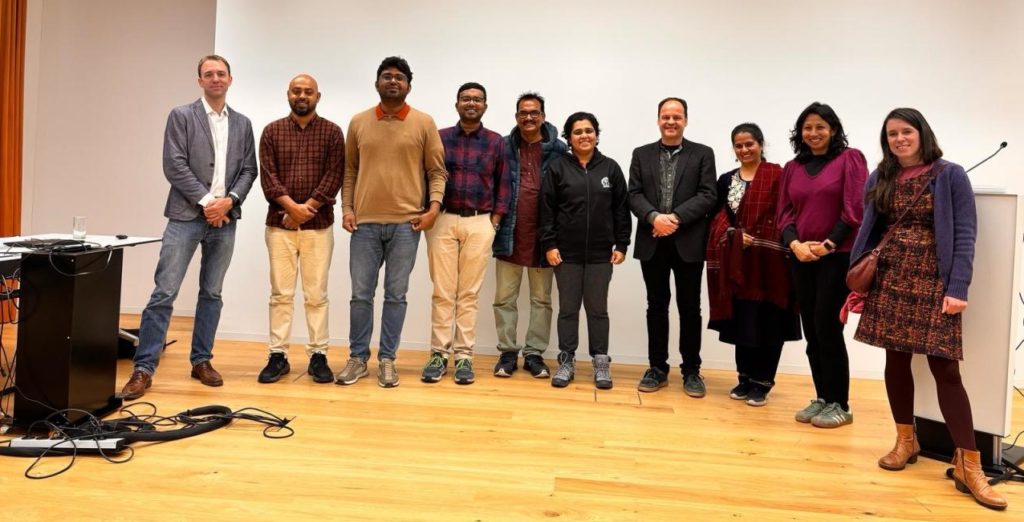
by emilie.cremin@gmail.com | Mar 18, 2025 | Previous Events, Uncategorized
Tuesday 18th of March 2025
12 pm to 1.30 pm: Seminar at SDC (Swiss Agency for Development and Cooperation) in Bern, Eichenweg 5 3003 Bern-Zollikofen
SOR4D Seminar “Resilience in the Sundarbans”
Tuesday 18th of March 2025, 12 pm to 1.30 pm, Room Nil 1, SDC, Eichenweg 5, 3052 Zollikfen

Open event (RSVP)
Contact: Jonathan Demenge: jonathan.demenge@eda.admin.ch Registrations: Lätt Louise louise.laett@eda.admin.ch
The seminar will present the project “Social resilience in the Sundarbans”, ENGAGE4Sundarbans, and will foster an exchange between the public and the research team on the experience and findings on the project and transdisciplinary research supported by SDC and the SNSF through the SOR4D program. The event is open to the public of development practitioners and researchers.
The project aims to enhance the “social resilience” of subsistence farming communities living in rural areas of the Ganges-Brahmaputra delta, on the outskirts of the Sundarbans Forest, a large mangrove forest. The project examines how small-scale farmers in Kumirmari (India) and Pratapnagar (Bangladesh) perceive and experience their social vulnerability and their exposure to multi-hazards such as floods, storm surges and salinisation. Knowledge is built on archival research, household surveys, and ethnographic fieldwork to develop a comparative synthesis of their challenges.
To support these rural communities, the project implements “real-life labs” as experimental spaces to translate knowledge into actionable solutions. These labs explore sustainable fisheries and integrated agroecological market farming, guided by local ecological knowledge and community collaboration. Initial findings reveal that agroecological practices require collective action and institutional support for long-term sustainability. Market access emerges as a significant obstacle for rural communities, necessitating innovative strategies for resource management.
The project proposes leveraging community-managed commons, such as canals and tidal plains, through collective use and governance. By fostering cooperative farming initiatives, the transdisciplinary team, comprising members from India, Bangladesh, and Switzerland, supports the development of community-driven solutions. Ultimately, the creation and management of new commons aim to strengthen social cohesion, promote collective work, and enhance community resilience in this socio-ecologically fragile region.
The SOR4D programme (2022-2030)
The Solution-oriented Research for Development (SOR4D) programme is a joint funding instrument between the Swiss Agency for Development and Cooperation (SDC) and the Swiss National Science Foundation (SNSF) implemented in the “Decade of Action”: that is accelerating efforts towards achieving the Sustainable Development Goals (SDGs) of the 2030 Agenda for Sustainable Development (2030 Agenda). The overarching goal of the SOR4D programme is to produce better knowledge, solutions and innovation by needs-driven, transdisciplinary research that opens up new ways for advancing sustainable development and reducing poverty in the least developed, low and lower-middle-income countries.
Speakers and Research Team
Prof. Dr. Jenia Mukherjee (Principal Investigator, IIT Kharagpur, India)
Jenia, Assistant Professor at the Department of Humanities and Social Sciences (IIT Kharagpur), is a transdisciplinary researcher on water-society relations. Jenia is providing research coordination and outreach support to the Indian team. Apart from her research contributions, her (long-term) agenda is to mobilise research communities and practitioners with the SOR4D-driven action framework through lectures, policy talks, MOOCs, and other policy-relevant, field-oriented outputs (training manuals, user brochures, etc.).
Prof. Dr. Samiya Selim (Principal Investigator, University of Libel Art of Bangladesh, Bangladesh)
Dr. Samiya Selim, Director and Professor, Center for Sustainable Development, University of Liberal Arts Bangladesh specialised in the field of environment conservation, climate change and sustainable development, specifically ecosystem-based management, sustainable livelihoods, socio-ecological systems, climate change adaptation and resilience, ecosystem services, and science-policy interface.
Prof. Dr. Anuradha Choudry (Co-Principal Investigator, IIT Khragpur, India)
Anuradha, Assistant Professor at the Department of Humanities and Social Sciences IIT Kharagpur and Outreach Coordinator at the Indian Knowledge Systems, Division of Ministry of Education, Government of India, is anchored in Sanskrit studies, Psychology, Indic philosophies, and yoga traditions. She conducts and disseminates Indic research and specializes in cultural heritage and community traditions for ecosystem-dependent societies inhabiting vulnerable delta ecologies such as the Chilika and the Sundarbans. In this project, Anuradha experiments with cognitive frameworks to map transitions from community vulnerability to viability in fragile ecosystems.
Mr. Tapas Mandal (Project coordinator, SJSM, India)
Tapas is a proactive community leader with over more than 30 years of experience working on community development and filmmaking, using the medium for grassroots activism and mobilization. His film “Voices of the Sundarbans” (funded by the Global Green Grant Fund in 2018) documents Forest Dependent People of the Sundarban forest in their struggle for survival and their livelihoods and lifeworlds as fishers, farmers, honey collectors and crab collectors.
Mr. Nurul Islam Biplob (Project coordinator, Sajida Foundation, Bangladesh)
Nurul is currently working as lead researcher at the Sajida Foundation, based in Dhaka, Bangladesh. As an anthropologist specializing in climate change, he is deeply passionate about studying the intricate relationship between societies and their environments. Nurul’s primary research interests revolve around climate governance, climate migration, and urbanization.
Mr. Md Faisal Imran (Research collaborator, University of Liberal Art of Bangladesh)
Md Faisal Imran is a development professional working as a Senior Research Associate at the Center for Sustainable Development (CSD), ULAB. He completed his Master’s in Zoology (specialization in fisheries) and his Bachelor’s in Zoology from Jagannath University.
Mr. Souradip Pathak (Research Assistant, PhD candidate, IIT Kharagpur, India)
Souradip Pathak is an institute Doctoral Researcher at the Rekhi Centre of Excellence for the Science of Happiness, IIT Kharagpur. His Doctoral work focuses on ‘Crafting interactive ‘fluid’ governance: Knowledge co-production through multi-stakeholder engagement, reflections from the Indian Sundarbans’ in the context of fishing communities. His area of research interest includes political ecology, human rights, environmental governance and sustainable development goals (SDGs).
Prof. Dr. René Véron (Principal Investigator, University of Lausanne, Switzerland)
René Véron is a professor of social geography at University of Lausanne with primary interests in the field of development studies. His policy-oriented research addresses urban and rural environmental governance issues in the global South with a regional specialization in South Asia, where he has been involved in international collaborations since 1994. For the SOR4D project, René brings expertise on decentralization and rural governance in West Bengal. More recently, he has contributed to the literature on (urban) political ecology, and his research on flood governance in West Bengal and France in Switzerland is directly linked to the SOR4D project.
Dr. Emilie Cremin (Project coordinator, University of Lausanne, Switzerland)
Emilie Cremin is coordinating the project, from the Swiss side. She is a senior researcher, PhD in geography, with training in social, cultural, ethno-ecological and environmental geography. She conducts action research for community engagement in the collective management of river and coastal ecosystems commons and multi-hazard risk assessments and supports communities in developing and implementing collectively built agroecological solutions through integrating local knowledge into environmental policies.
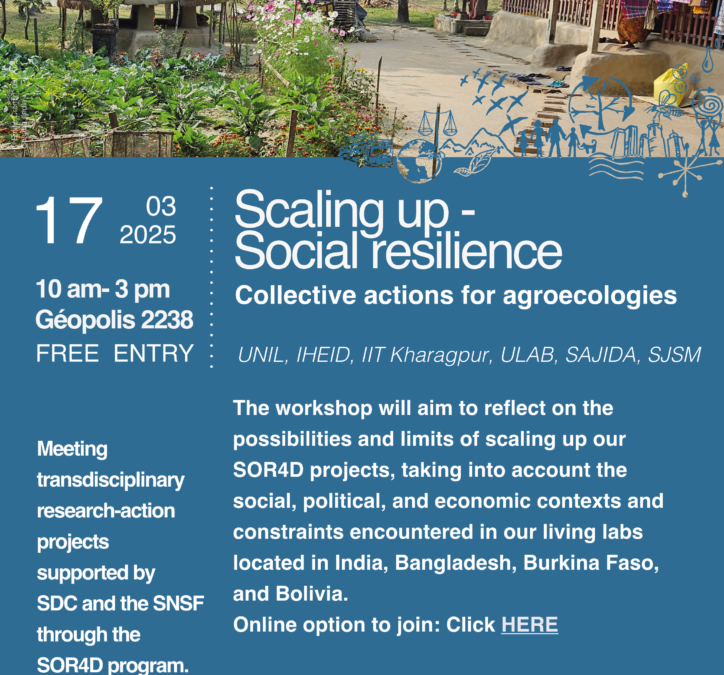
by emilie.cremin@gmail.com | Mar 17, 2025 | Previous Events, Upcoming Events
“Scaling up co-developed experimentations and Solutions for sustainability”.
on Monday, 17th of March (10 am-3 pm) at UNIL, Geopolis, Room 2238 Geopolis
Two SOR4D projects
ENGAGE4Sundarbans and the
SCALAGRO team members will join for a workshop to reflect on the scalability of experimental collective and agroecological farming.
The workshop has fostered an exchange between researchers and practitioners from India, Bangladesh, and Switzerland who work with local communities on the co-development of sustainable solutions to enhance social resilience.
It has aimed to reflect on the possibilities and limits of scaling up our SOR4D projects, taking into account the social, political, and economic contexts and constraints encountered in our living labs located in India, Bangladesh, Burkina Faso, and Bolivia.
10h-11h: ENGAGE 4 Resilience in the Sundarbans
We have discussed, in particular, our conceptual framework of social resilience, our methods, and the solutions we put in place to support rural communities in our two coastal study areas of the Sundarbans, India and Bangladesh. Project:
ENGAGE4Sundarbans11h-12h: SCALAGRO
Issues, objectives, methods and Solutions developed by the communities supported in Bolivia, Burkina Faso and Andhra Pradesh
12h -13h: Lunch time at the Géopolis cafeteria
13h00- 15h: Scaling-up
What is the demand for the SOR4D program to scale up?
Based on our team’s expertise, what are the possibilities, and the limits to scaling up?






